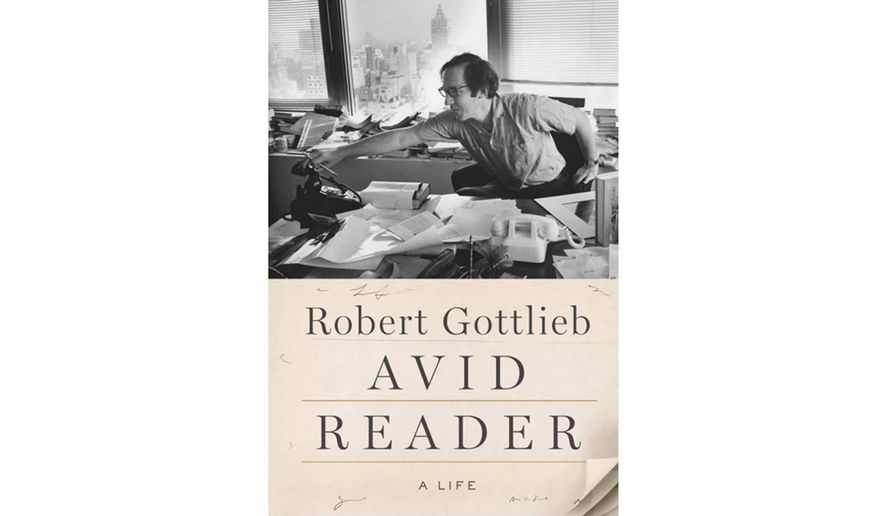OPINION:
AVID READER: A LIFE
By Robert Gottlieb
Farrar, Straus and Giroux, $28, 337 pages, illustrated
Reading this vibrant memoir by New York publishing legend and The New Yorker magazine editor Robert Gottlieb left me with two main conclusions: one surprising, the other anything but. I was astonished at how revealing, nay unsparing, he was about himself, but understood immediately why those authors fortunate enough to be edited by him felt themselves to be so blessed, for his interaction with them and their work was of a truly phenomenal intensity.
Many of these were celebrated figures before he worked with them: Lauren Bacall, Irene Mayer Selznick, Katherine Graham, Jessica Mitford and Bill Clinton among many others. But there were also writers whom he introduced to this country and made famous here, like Sybille Bedford and Doris Lessing. And I’m pretty sure that even the lesser known would have benefited from his all-encompassing attention, because I doubt that he is capable of any other method of editing other than total engagement.
Those famous names inevitably lead to a fair dose of gossip, much of it amusing, as in Bedford’s barbed compliment about Julia Child’s cuisine: “You must understand that Julia’s cooking is very good — very good hotel cooking.” But it is characteristic of Mr. Gottlieb that he precedes this putdown by saying that “Sybille was an impassioned, and snobbish, food person,” for the gossipy stuff in these pages is definitely subordinate to really valuable insights into the character, nature and talent of those under discussion. Mr. Gottlieb’s boldness is evident in his willingness to speak negatively when he feels it is called for and the fact that he is prepared to do so among authors still living is braver than most. Equally impressively, he does not shy away from airing his own neuroses — sometimes in passing, as in his inability to fly for many years — but in more detail about the failure of his first marriage, his conflict with his father and years of psychoanalysis.
Among the many extraordinary examples of his editing methods, the attention which he lavished on Mrs. Selznick and her autobiography “A Private View” stands out:
“I arrived for a drink about six. We were still talking — and talking and talking — at midnight, not even taking time out for a meal. The business of the book was quickly settled. What she was doing was dazzling, the tone unique and riveting, her words revealing a remarkable honesty and degree of unsparing self-knowledge. At once I said I would publish it. But what kept us talking for six hours — and then for fifteen years until the day of her death — was an affinity so pronounced it almost made me a believer in the ‘separated at birth syndrome.’”
Which is not to say that there was not a huge amount of editorial slog for Mr. Gottlieb, sorting through folders, eliminating repetition, shaping what became an exemplary work.
If I have one reservation about Robert Gottlieb as he presents himself here it is about a certain air of smugness. Not about himself: he has been too honest about the personal demons he has fought throughout his life and the efforts to subdue them. Nor about his justifiable pride in his family, again because he has not held back about the travails he has suffered in that arena at various times in his life. Rather it is about his noticeably un-self-critical critical judgment of writers and their work.
I dare say that unshakeable conviction in his literary compass stood him in good stead throughout his career, but for those of us who do not share, say, Mr. Gottlieb’s enormous admiration for Joseph Heller and particularly “Catch 22,” his complacency can be grating. He does, however, quote the magisterial critique by Evelyn Waugh, whose opinion had, as it turned out, unwisely been sought for a quote. Among other things he singled out its “prolixity,” suggesting it should be “cut by about a half,” says it is not a novel, but rather “a collection of sketches — often repetitive — totally without structure.” He does admit that “much of the dialogue is funny,” but goes on waspishly and sternly to say: “You may quote me as saying: ‘This exposure of the corruption, cowardice and incivility of American officers will outrage all friends of your country (such as myself) and greatly comfort your enemies.”
Mr. Gottlieb does have the good grace to write that he enjoyed this missive and to add “We didn’t take him up on his offer, though we probably should have.” But I would hazard a guess that the regret has more to do with a lost publicity opportunity than with absorbing the opinion of a great writer, superior in my judgment to any he ever had the good fortune to edit. If Waugh’s devastating verdict could have shaken his own judgment even a little, I’d have more respect for it.
• Martin Rubin is a writer and critic in Pasadena, Calif.




Please read our comment policy before commenting.